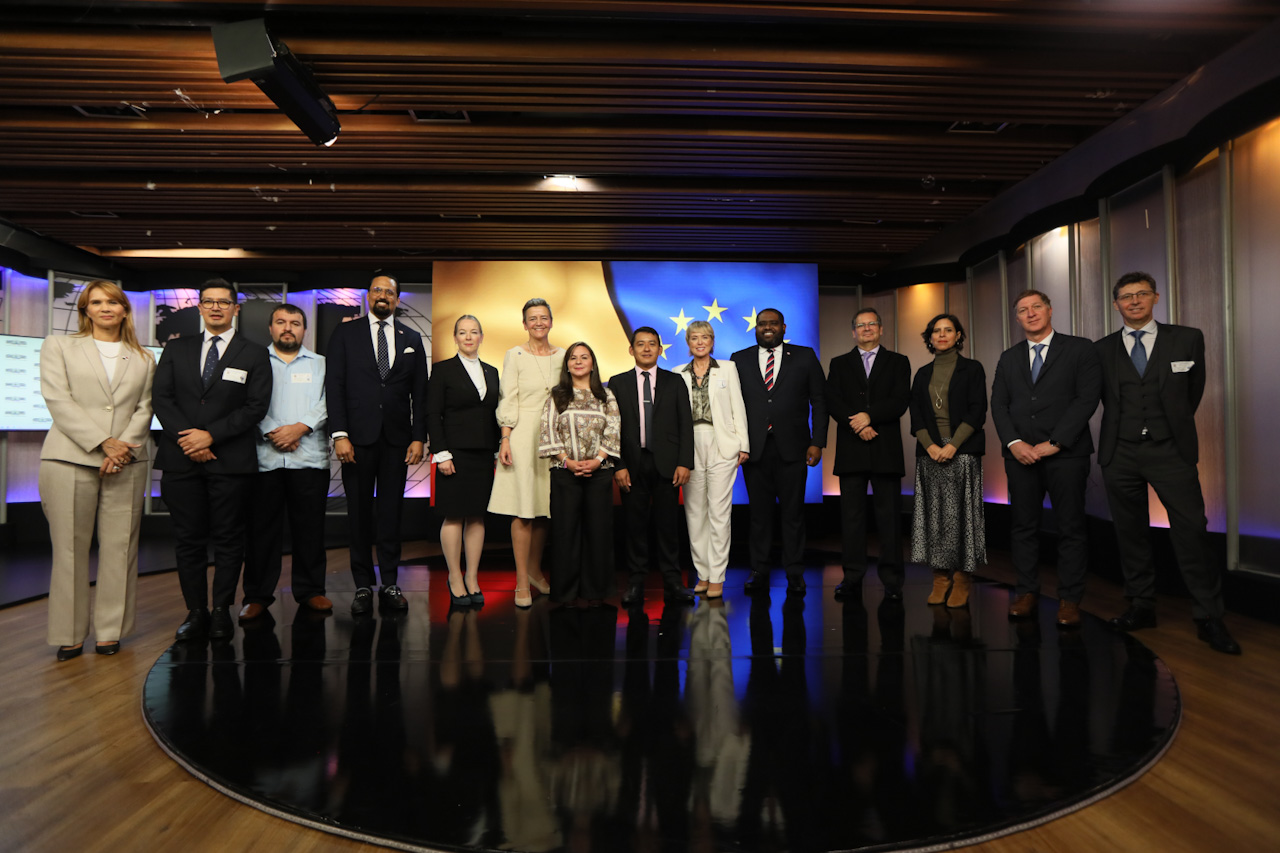(Bogota, 14 March 2023). Between 13-15 March, Colombia received the official visit of the Executive Vice-President – Europe fit for the Digital Age, and Commissioner for Competition, Margrethe Vestager. One of the key events of the visit was the official launch of the “Digital Alliance between the European Union and Latin America and the Caribbean”, the first digital coalition at the regional level, which took place in the Presidential Palace, Casa de Nariño.
On this occasion, the Vice President held meetings with the Senior Advisor to the President of the Republic of Colombia for Digital Transformation, Saúl Kattan, the Minister of Information and Communication Technologies, Sandra Urrutia, the Minister of Science, Technology and Innovation, Arturo Luna and representatives of other ministries and national agencies. In these meetings, a bilateral package of concrete actions was agreed to strengthen the partnership and cooperation between the European Union and Colombia in the field of digitalisation, as part of the Global Gateway* strategy of the European Union, coordinated by the European Commissioner for International Partnerships, Jutta Urpilainen. Some of these actions are:
- On connectivity, the European Union declared its commitment to mobilise support to facilitate compliance with the Government plan to connect 85% of the population and, through it, facilitate the presence of the State in the territories and the peace process. European support, through technical and financial cooperation, will help to increase connectivity, but also to guarantee the resilience and security of networks and, ultimately, reduce inequalities.
In the specific context of preparing 5G licenses, the European Union will support Colombia with technical assistance in generating measures to mitigate the risks related to its deployment based on its own experience. A fundamental part of this effort is the mobilisation of non-reimbursable resources and guarantees to facilitate public and private investment through Public Private Partnerships (PPP) schemes. It was also agreed to advance in the design of 3 pilot projects in 3 municipalities to test effective connectivity approaches, facilitating access to services and opportunities for the population.
- On cybersecurity, the European Union makes support available to Colombia for the creation of the National Cybersecurity Agency and specific training by authorities of its own Member States, for example within the framework of the EUCyberNet/LAC4 project (www.lac4.eu/es – www.eucybernet.eu). It was also agreed to strengthen cooperation in the fight against cybercrime and adherence to the principles of the Budapest Convention.
- In terms of space, the European Union also makes available its experience and data from its constellations of satellites Copernicus (Earth observation https://www.copernicus.eu/es) and Galileo (positioning) to the country to enable development of a space agency. This would allow, among other things, to facilitate the systematic use of satellite data and signals, particularly to improve the management of natural resources and face challenges such as natural disasters, climate change, deforestation, illegal mining, coastal erosion, biodiversity loss and informal settlements. Colombia already benefits from a cooperation agreement in the framework of Copernicus and there are at least three Colombian academic institutions that are part of the Copernicus Academy international academic network:
https://www.copernicus.eu/en/opportunities/education/copernicus-academy.
- Regarding the development of digital entrepreneurship, through a project led by the Chamber of Commerce of Bogotá, the European Union provides technical assistance on issues associated with digital business transformation. In addition, within the framework of the Digital Alliance, a Digital Accelerator is made available to Colombia to promote collaboration between the private sector, access to financing and the promotion of impact investments. This initiative will work as a multi-sector platform that will connect the business opportunities of large corporations with start-ups and innovative SMEs, supporting these companies up to a stage of investment readiness and providing them with specific benefits.
- Regarding regulatory dialogue, within the framework of the Digital Alliance, the experience of the Member States and European institutions in digital matters is also made available to Colombia. The European Union and Colombia take note of their joint interest in deepening their dialogue in multiple areas such as radio spectrum management, privacy and data governance.
In the high-level meetings that were also held with the Minister of Mines and Energy, Irene Vélez, the Minister of Finance, José Antonio Ocampo, and the Vice President, Francia Márquez, there was agreement on the importance of building a digital transformation based on shared principles and values, and above all, centred on the human being. Some fundamental principles of this construction are the digital inclusion of marginalised populations through digital literacy programmes, and the fight against phenomena such as cyber-bullying and gender-based violence.
The European Union and Colombia agreed to advance in the dialogue on this basis and in the design of concrete actions, with an eye toward the EU-LAC Presidential Summit scheduled for July 17 and 18, 2023, in Brussels.
Click here to see the factsheet on the EU – Colombia partnership on digitalization.
About Global Gateway
The Global Gateway strategy is the initiative of the European Union to reduce the global investment gap, support global economic recovery and accompany the green transition and the digital transition, beyond the borders of Europe.
This initiative seeks to promote large-scale, transformative projects that combine public and private financing for investments, with a strong component of support for infrastructure projects.

